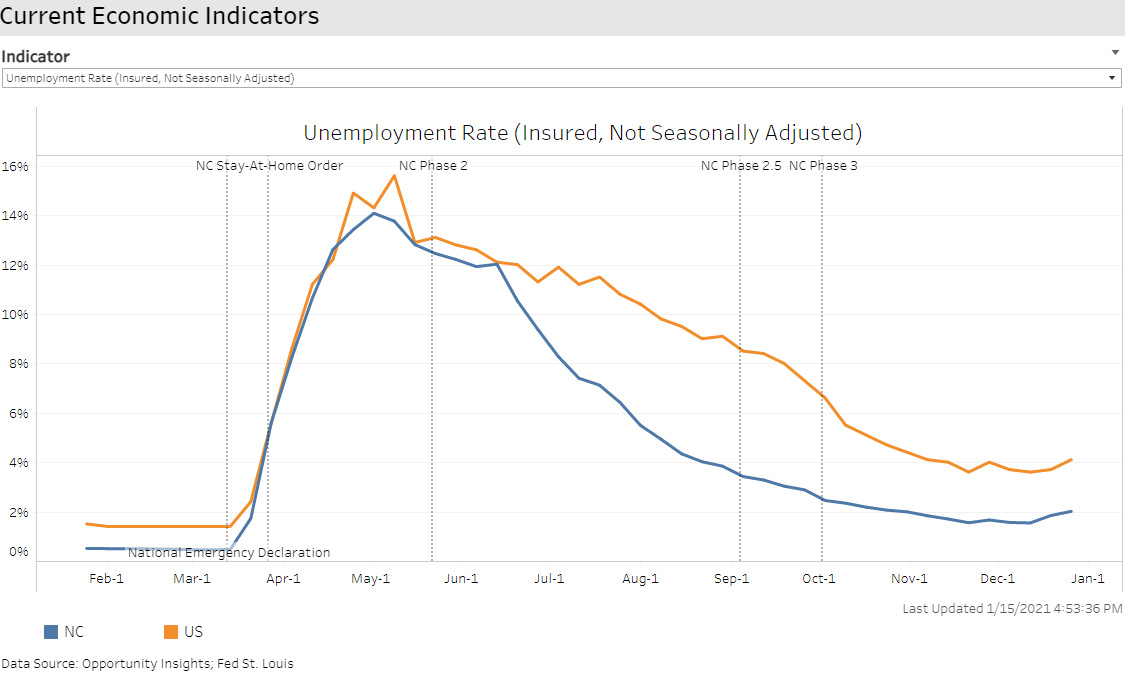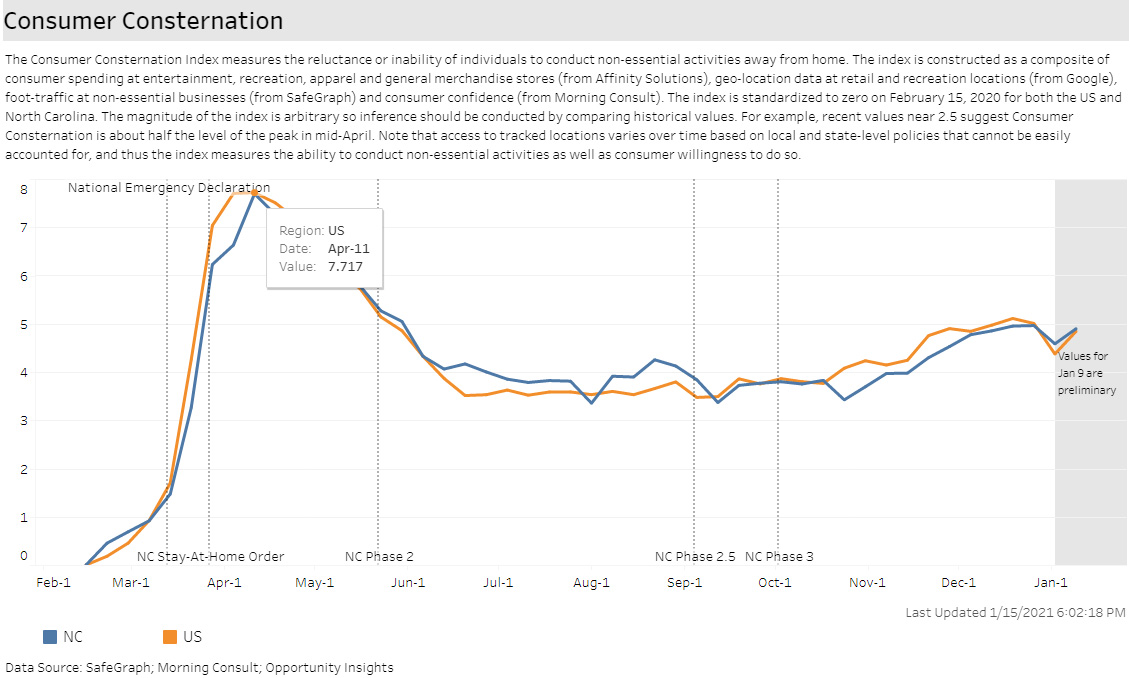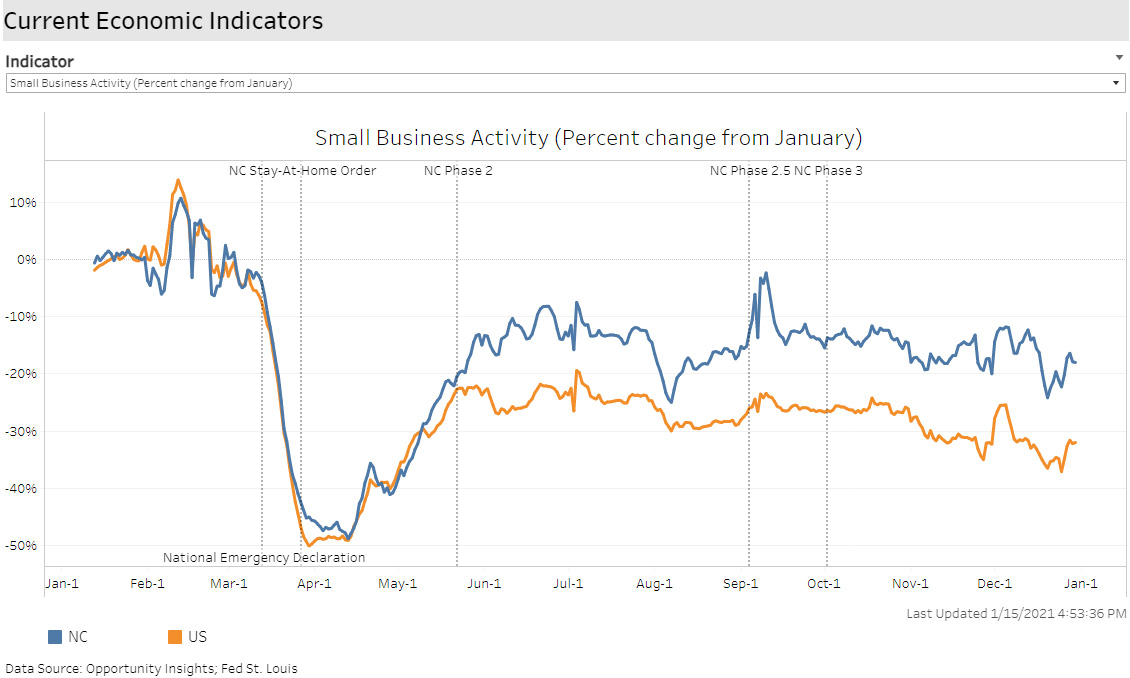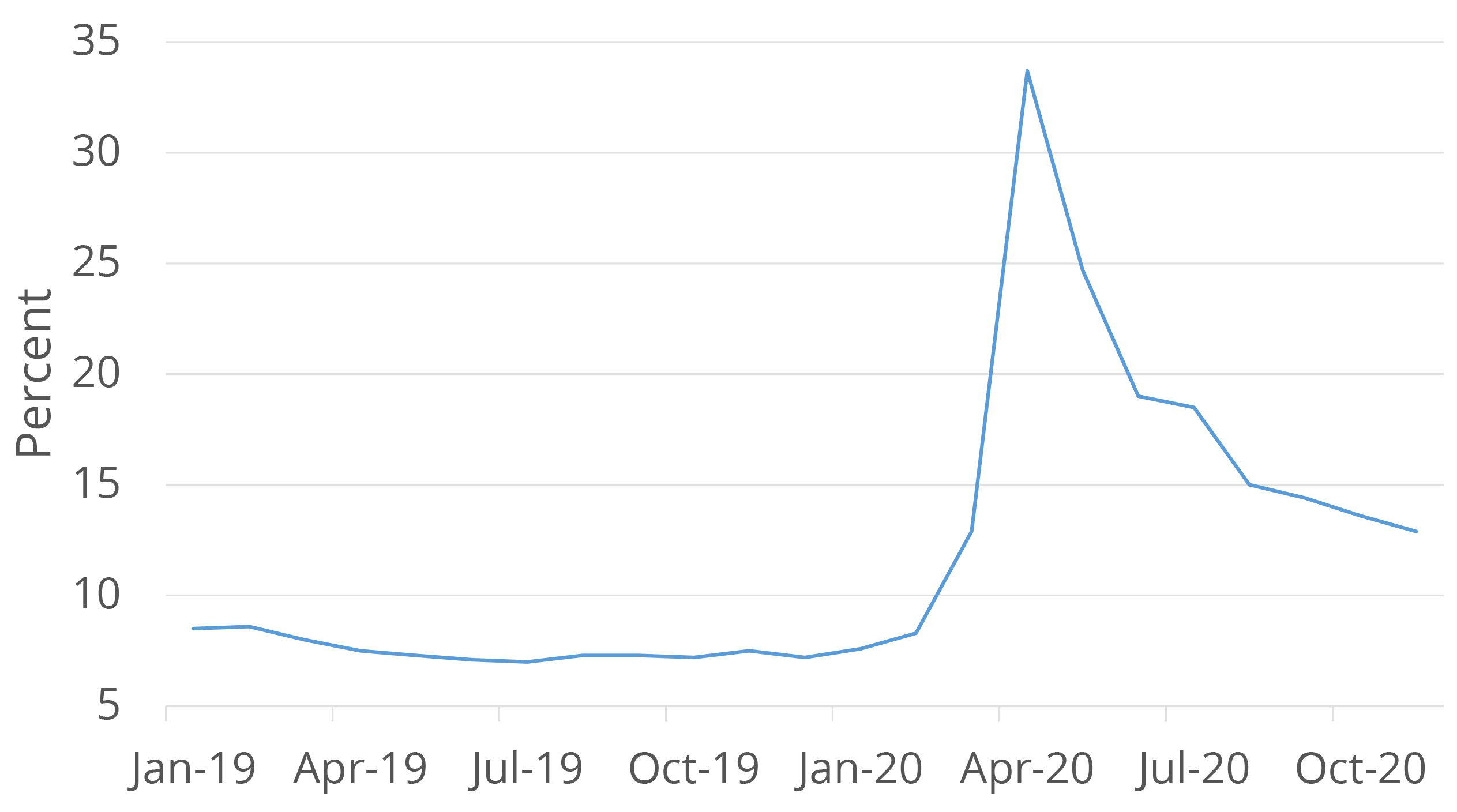Biden and the Economy—What Can We Expect?
On January 20, Joseph R. Biden, Jr. will become the 46th president of the United States. He’ll take the oath of office as the POTUS with the longest record of service in Congress, in addition to his eight years as vice president to Barack Obama. Biden clearly has the knowledge and experience to rapidly advance a new policy agenda. But doing so won’t be that simple.
What are Biden’s highest priorities for business and the economy? What can we expect in the first 100 days of this new presidency and from the newly sworn-in 117th Congress? What can we learn from the elections? What is the political environment in the wake of the January 6 attack on the Capitol? What can and cannot get done even with control by the president’s party of both houses of Congress? In this Inauguration Day Kenan Insight, we look at what the Biden administration might mean for the economy and business activity in 2021.
Our country is exceedingly divided.
Although the Democrats now have control of both Congress and the White House, the November election was far from a mandate for the new administration’s agenda. With record turnout of more than 158 million voters, about 81 million (51.4 percent) voted for Biden and 74 million (46.9 percent) voted for Trump. Almost 3 million (1.8 percent) cast their ballot for someone else. This shows a very divided country; almost half of voters, 48.6 percent, did not vote for Biden.
The Georgia Senate runoffs on January 5 repeated this divided pattern, with Democrat Raphael Warnock defeating Republican Kelly Loeffler with a 1.86 percent vote difference, and Democrat Jon Ossoff besting Republican David Purdue by only 1.01 percent of the vote.
The governing margins in the House and Senate are paper-thin.
The makeup of Congress reflects the division among voters. Although Democrats retained control of the House, Republicans picked up at least 10 seats. House Speaker Nancy Pelosi has a governing majority of 222 Democrats to 211 Republicans (two races remain outstanding). On the roll call vote for speaker, six Democrats defected, voting “present” or for someone other than Pelosi.
The implication is that governing margins are perilously thin. Speaker Pelosi can only afford to lose four votes and still get to the magic number of 218 needed for a majority vote. In practice, this means that nearly all Democrats must be present for the vote (e.g., healthy) and nearly every member of the party must agree. A tall order!
Moving to the other side of the Capitol, there will be a 50-50 split between the Democrats and Republicans in the vote for Democratic control under Senate Majority Leader Chuck Schumer, with Vice President Kamala Harris breaking any tie. Senator Schumer cannot afford to lose a single vote.
January 6, 2021 was a “9/11” life-changing event for every member of Congress.
At 1 p.m. on January 6, the U.S. Congress met in joint session to count the Electoral College votes for president. At 2:22 pm, members were forced to don gas masks and take cover while witnessing Vice President Pence, Speaker Pelosi and Senate President Pro Tem Grassley (the top three individuals in the presidential line of succession) being escorted out of the session by the Secret Service.
This sobering event changed the tenor of debate, as shown by the floor speeches of Senators Schumer and McConnell when they returned to the Senate that evening. Members are still digesting this game-changer and what it means for governing.
Relationships, communication and trust matter.
Joe Biden served in the U.S. Senate for 36 years (1973-2009). Thirty-one of the current senators were members of Congress during that time, most notably, Mitch McConnell, who assumed office in 1985. Polar opposites on the political spectrum, Biden and McConnell share a trust in each other and a genuine friendship built over 35 years.
For example, when the 2012 budget talks broke off, Senate Minority Leader McConnell called Vice President Biden and found a new “dance partner” to successfully broker a deal to keep the government from shutting down. This type of trust allowed Biden to telephone McConnell last week to discuss the possibility of dual-tracking presidential Cabinet confirmation hearings and a Senate impeachment trial.
Politics makes strange bedfellows, but continued communication-building on the existing reservoir of trust between Biden and McConnell will increase the likelihood for compromise.
Healer in chief: President Biden has one chance to make a good first impression.
President Biden ran on the promises that he would get the pandemic under control, “build back better” (focusing on climate change/infrastructure/job creation), achieve racial justice and bring the country together. Biden has a combination of tools, including executive orders, the Congressional Review Act and legislative action, to move forward on these top priorities.
Yet given the recent explosive events and the high fever the country is running, President Biden’s promise to become “Healer in Chief” becomes an overarching imperative. Biden has one chance to make a good first impression. His initial choice of priorities, tone and outreach will establish the political environment for the next four years.
It seems logical to us that, leading by example, Biden could promote a calmer environment by first focusing on bipartisan legislative solutions to the pandemic and economic recovery that help workers and businesses, especially those disproportionately affected.
Specifically, he could reach out to the Problem Solvers Caucus of 50 House members, split evenly between Democrats and Republicans and led by Representatives Josh Gottheimer, D-N.J., and Tom Reed, R-N.Y., along with their Senate counterparts Joe Manchin, D-W.Va, Susan Collins, R-Maine, and Bill Cassidy, R-La., to build on their success in securing the year-end pandemic emergency relief package.
Democratic and Republican leadership have a choice.
Senate rules require 60 votes to end debate before a simple majority vote on most legislation, which requires all Democrats plus at least 10 Republicans in the current Senate makeup. Presidential nominees and budget reconciliation require only 51 votes, yet more than 1,200 presidential appointments, including Cabinet members, must be Senate-confirmed. Given the required two hours of floor debate per nominee, without reaching bipartisan agreement to expedite the process, it would take 100 days of the Senate working 24/7 to put President Biden’s team on the field.
Consequently, Democrats have a choice: to work solely within the party, refuse to negotiate and get a limited number of things done with 51 votes, or collaborate, move to the center to reach consensus with Republicans and pass bipartisan legislation that can be signed into law.
Republicans also have a choice: to obstruct, refuse to negotiate and have no influence on the process, or collaborate, move to the center to find common ground with Democrats and be at the signing ceremony with the Democrats in the Rose Garden.
From Chuck Schumer and Mitch McConnell’s vantage point, the easiest thing to do would be to appease their respective bases on the left and the right. The tougher choice will be to lead by moving to the middle and getting bills passed, but with a near guarantee to irritate their respective party’s base.
Current business and economic conditions in the U.S.
So, what does this fragile state of affairs mean for legislation affecting businesses and the economy? Unfortunately, the only thing more fragile than the U.S. political climate may be the nation’s economy, which has unambiguously slowed in recent months. Data on employment and consumer spending from November and December, along with various other measures of business activity, indicate a clear dip in economic activity. These declines are potentially significant enough to mean that the U.S. has fallen into the dreaded “double-dip” recession that we’ve been fearing since the summer.
The likely drivers are twofold. First, the recent significant spike in COVID-19 cases has resulted in stronger restrictions in many places, as well as an increase in people’s reluctance to engage in nonessential activities away from home. For example, our real-time measure of current economic activity shows a turning point in unemployment claims in mid-December, with three straight weeks of increases (after months of decline). Likewise, our measure of consumer consternation (the unwillingness and inability of consumers to engage in nonessential activity away from home) has been increasing since early November (except for a small dip around the year-end holidays). Although additional aid was passed on December 21, providing both direct payments to many households and additional unemployment and small business benefits, it has not yet had time to have a meaningful impact. For example, the next round of Paycheck Protection Program (PPP) loans is only now getting underway and is targeted toward a narrower slice of businesses than the previous round.


Herein lies an opportunity.
Although the legislative environment is fast moving, the economic proposal from the incoming Biden administration looks to provide a much larger and more broadly based stimulus. And herein lies an opportunity to find a bipartisan deal that can lead the way to additional success down the road.
In fact, the central provisions in the plan are unequivocally critical for the economy in 2021. The first and most important efforts center on controlling the pandemic. This is the most essential provision and represents the only avenue to a sustainable recovery in 2021. Accordingly, our analysis suggests that a competent and coordinated vaccination operation should allow most U.S. businesses to begin resuming in-person operations late in the second quarter. This would lead to a swift normalization of business activity in the third quarter. However, an improved vaccination rate is a linchpin behind this conclusion, so the Biden plan must effectively correct the shortfalls uncovered in the course of the current rollout.
Second, the Biden proposal carves out $350 billion for state and local government budget relief. Although state government support proved controversial throughout 2020, the election outcomes make support significantly likelier. Furthermore, it’s important. For perspective, according to the Urban Institute, total state tax collections were down 3.2 percent year-on-year from March 2020-November 2020, with 29 individual states suffering declines, some significantly so. Although there are legitimate complaints about the degree to which state governments responsibly manage their budgets (hence the earlier disagreement), a significant positive multiplier effect is clear in that an injection of federal money will prevent layoffs of critical public sector workers.
Third, we stress the importance of further support for small business through a $50 billion top-up for PPP loans. Our analysis shows that small businesses have never really recovered, on average, in a manner commensurate with large businesses. As the pandemic wore on in the second half of 2020, small business activity plateaued and then distressingly trended down. Given that small businesses employ roughly one-half of the U.S. labor force, a legitimate question is whether the additional PPP support will be enough.

Although the new Biden proposal also provides a $1,400 direct payment to households in addition to the $600 appropriated in the December aid bill (as well as an extension of unemployment benefits), we are less optimistic about this proposal. Of course, direct payments are very important for certain highly-affected households, but they will likely have a limited effect on the overall economy. The correct lens through which to evaluate any stimulus effort is through the so-called “multiplier effect”—simply put, what additional economic activity the stimulus engenders so that there is a snowball effect well beyond the government’s initial injection. Given that most households will save some or all of these funds, the overall bang for the buck is likely muted; a key takeaway from the first wave of aid in spring 2020 was a significantly elevated savings rate. In contrast, given the fact that the proposed extension of unemployment benefits targets directly affected households, it is likely to be more effective from a multiplier perspective.

Finally, a comment on the Federal Reserve is warranted. The reality is that further monetary stimulus will likely produce little effect (and risk elevated inflationary pressures going forward). The central banks of the world have largely shot their bullets; indeed, the Fed has thrown the gun. It is instead the job of the U.S. federal government to build a bridge to the other side.
Either a lot of things will get done, or nothing will get done.
Given the paper-thin margins in Congress and the life-altering events of January 6, there is a unique opportunity to get a lot of things done. One vote in the Senate and a handful of votes in the House can make a difference.
Let’s hope our leaders rise to the challenge, exercise their lethargic legislative muscles of constructive debate and collaboration, and build bipartisan consensus by hitting singles and not swinging for the fences of partisan policy-making homeruns.
We challenge President Biden and the 117th Congress to heal this divided country, touch all the bases, and walk it down the middle, member to member, one bill at a time, one solution at a time. The stakes are high—the future success of America. Batters up, let’s play ball!
- Keyword(s):
- covid-19 192
- economic outlook 276


